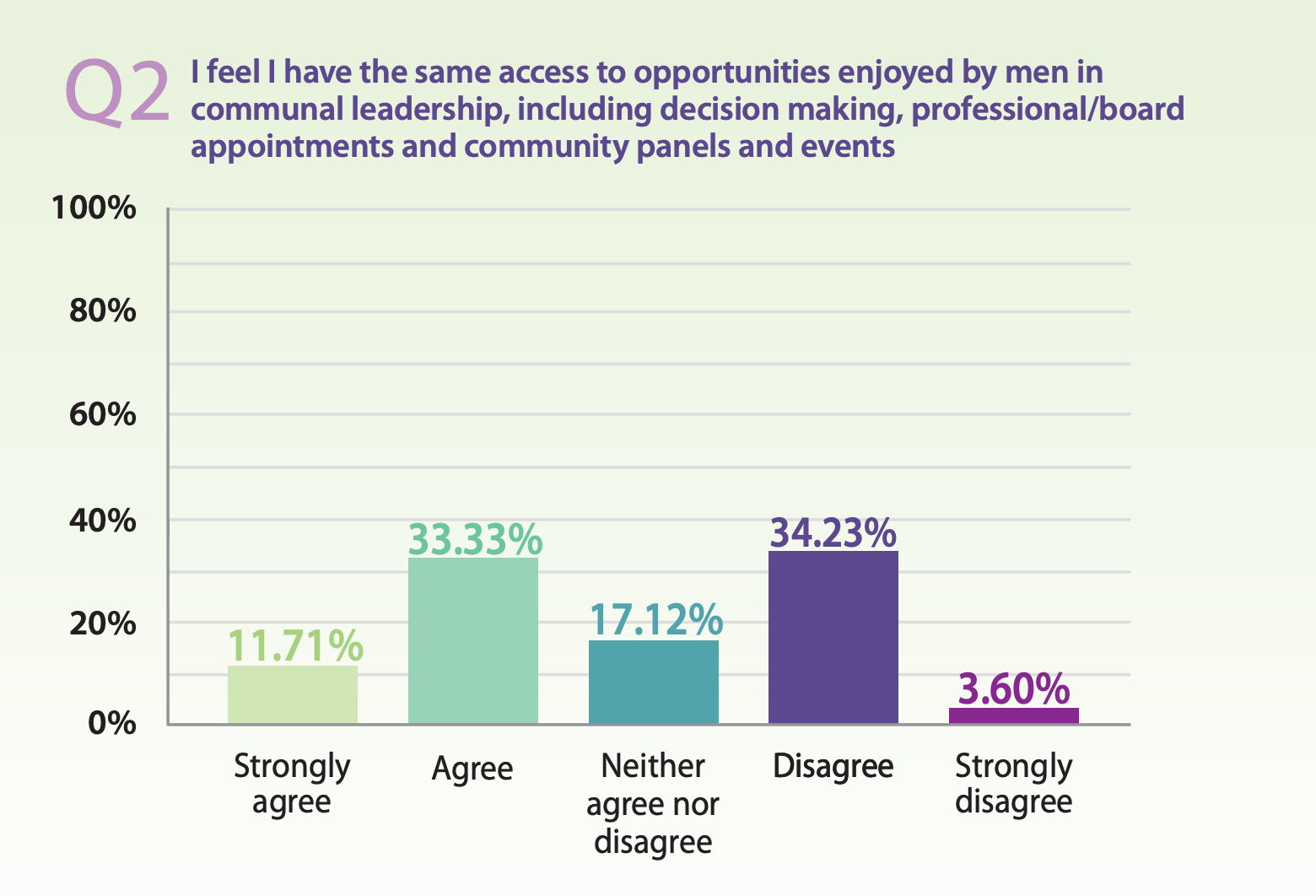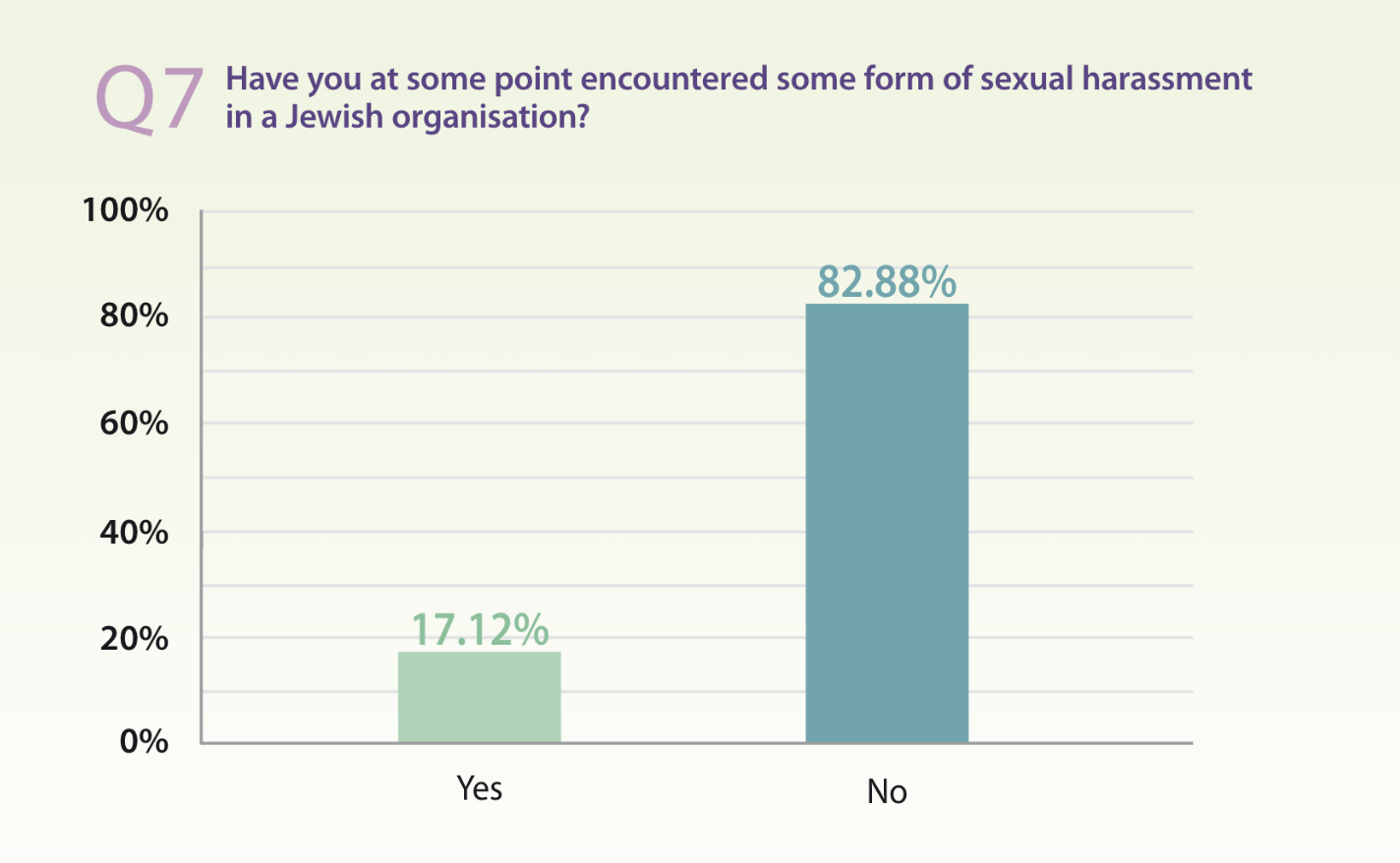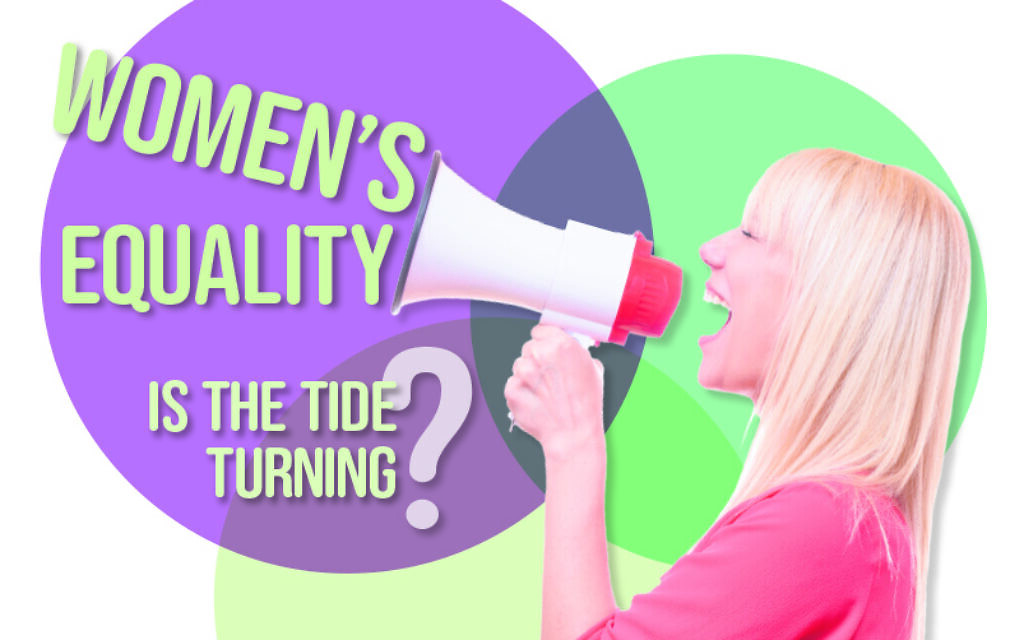Women’s equality: is the tide turning?
The AJN has conducted a special investigation, surveying the experiences of 111 Jewish women in professional/board roles in Jewish organisations. The results are alarming.
CAREER ASPIRATIONS AND DEVELOPMENT
ONLY half of the women surveyed agreed (37 per cent) or strongly agreed (13 per cent) that they have equal career progression opportunities and their development and aspirations are nurtured. The topic generated some strong comments, many lamenting that most leadership positions are filled by men, with a lack of mentorship and support opportunities available to challenge the status quo.
“There is still a very strong culture around trusting only males in their 60s to lead the large Jewish organisations, with many current leaders just on rotation between all the organisations,” read one comment, continuing, “There are many enthusiastic and talented women in our community who are lacking the support, mentorship and overall encouragement to seek out opportunities for leadership.”

Another respondent wrote, “I’m sick of mentoring young Jewish women with the lie that their talent, skills, drive and ambition will allow them to attain the roles and salaries [held by] men half as talented as they are. It won’t. In our community, competent men continue to be valued and rewarded over competent women (the same women who prop them up and cover for them). Enough. It’s f***ing time.”
Indeed, frustrated by the lack of pathways to top positions, a respondent shared, “I would have liked to have been mentored to become the president of an organisation but [I] received no support to take on the role and ended up stepping away completely.”
“There is so much scope to step up opportunities,” commented another woman who said she had worked in multiple Jewish organisations and received little to no professional development or mentoring. She observed that while organisations might be female dominated, “senior positions are filled by men”.
“This has not changed significantly in the last decade. I find it very discouraging.”
 Suggestions were made around increased senior leadership training, the current lack effectively “preventing women from joining boards or progressing to more senior roles”.
Suggestions were made around increased senior leadership training, the current lack effectively “preventing women from joining boards or progressing to more senior roles”.
But Executive Council of Australian Jewry’s public engagement officer Samantha Khavin told The AJN that she believes “the tide is turning for the better”.
“With gender equality becoming an increasing priority in many sectors, and a large amount of work being done to even the playing field, I am confident that our community can overcome this challenge,” she said.
As one respondent relayed, “Many women feel they need to be asked or given permission to lead,” she said.
“Male and female leaders must do more to help lift women up, develop their confidence and willingness to take on communal and organisational leadership positions – both lay and professional.”
CULTURE, VALUES AND RESPECT
ALTHOUGH over 80 per cent of women said they feel valued and encouraged to contribute to their board or workplace, numerous anonymous comments shared with The AJN point to the existence of an entrenched cultural bias surrounding women.
Airing her frustration, one respondent remarked, “Ageing males, even if they have become primary carers in their domestic sphere become hapless males in the public space. Not once in 10 years has a male offered to assist with providing refreshments, clearing up after [events]. They put away chairs, but washing up? clearing tables?”
While the Australian Centre for Jewish Civilisation’s associate professor Rebecca Forgasz – who is also the former director and CEO of the Jewish Museum of Australia – described her experience in Jewish community organisations as “very positive”, she noted there is “sometimes a double standard when it comes to personal leadership style … Behaviour that might be seen as appropriately assertive and commanding in men is interpreted as aggressive or pushy in women”.
The survey results indicate that 63 per cent of respondents feel uncomfortable with language used about or toward women in a Jewish organisation.
Stating the need for “greater respect, acceptance and opportunity for women outside of traditional ‘women’s roles’”, one respondent expressed her concern that women are “largely seen as appropriate only in the softer roles, like marketing or fundraising’.
#BREAKING An AJN special investigation has revealed an alarming reality: Over one third (37 per cent) of 111 women…
פורסם על ידי The Australian Jewish News ב- יום רביעי, 24 ביוני 2020
“The strategic and leadership roles are still largely filled by men”.
Even when women have reached senior positions, another respondent said an “ingrained male privilege” remains in place. “It is very difficult in Jewish organisations,” she stated.
One woman reported that when she felt unfairly treated based on her gender at a Jewish organisation, she was told “nothing would be done as that was the community culture. And it’s ‘harmless’”.
Looking ahead, another woman stated, “I think there needs to be better leadership from top organisations, with male Jewish leaders actually demonstrating changing behaviour, rather than mindless platitudes.”
Another respondent remarked, “There needs to be a change in culture, particularly toward the role of women.
“Women should believe and demonstrate they can lead without being dependent on male approval.”
BOARD PARTICIPATION
FOLLOWING the survey, a Sydney woman contacted The AJN to share her “very negative” experience on the board of a communal organisation.
“It was very heavy on the older male demographic, and I found that to be a very negative experience – so did the other woman who was sitting on the board.
“As the underrepresented gender, we felt like our opinions weren’t given the same consideration as other people.”
Both women left the board around the same time in 2014.
“They haven’t had another woman on the board since,” said the woman, whose experience has led her to “refrain from participating in the board space primarily based on that experience”.
Her comments speak to a concerning issue reiterated in the survey findings.
 Results indicated that only 12 per cent of women strongly agree with the statement: I feel I have the same access to opportunities enjoyed by men in communal leadership, including decision making, professional/board appointments and community panels and events. 33 per cent of respondents agreed, while 34 per cent disagreed with the statement altogether.
Results indicated that only 12 per cent of women strongly agree with the statement: I feel I have the same access to opportunities enjoyed by men in communal leadership, including decision making, professional/board appointments and community panels and events. 33 per cent of respondents agreed, while 34 per cent disagreed with the statement altogether.
Numerous women mentioned the lack of gender parity on boards, and called for a 40-50 per cent quota to be instated. However, some raised concern that when women generally have been appointed to boards, it is often simply a “token representation”, rather than women being “genuinely appreciated” for their contribution.
The survey responses captured a perception among a few that there were some communal leaders who have exploited the opportunity to support the National Council of Jewish Women of Australia (Vic)’s #MakeSpaceForHer campaign as an act “that seems mostly symbolic, or even virtue signalling and not particularly genuine”, said a respondent. “It’s still mostly a boys’ club with token females to ‘fill a quota’.”
She added that many leaders who signed the NCJWA gender equality pledge are “incredibly tone deaf”. The respondent deemed this to be the case when it comes to “symbolic gestures, such as taking a photo with a guest speaker. More often than not – it’s just a big group of males”.
CEO of the Australia-Israel Chamber of Commerce Michelle Blum said that a lack of gender and age diversity has meant organisations have not been representative, nor have they had the “right diversity of thinking around the table … I think this has been improving in recent times with a renewed leadership focus on this issue”.
Another woman acknowledged, “There have been significant improvements but there remains quite a way to go – especially to achieve genuine rather than tokenistic representation.”
BULLYING, DISCRIMINATION AND SEXUAL HARASSMENT
WHILE 63 per cent of women surveyed said they have never experienced gender-based bullying in a Jewish organisation, 32 per cent said they had “occasionally”, and five per cent reported it was a “regular” occurrence.
Reaching out to The AJN, a Melbourne-based CEO said she has experienced many challenges in answering to an all-male board of directors. She alleged that despite raising over $1million in fundraising (and being told by colleagues that she was on a low salary), she was denied a pay rise when she asked for one.
The woman also said she is regularly told she is “too emotional”, is often asked to justify her decisions, and her emails are monitored by her boss.
“I also recently told them I was pregnant and one of the directors was upset I didn’t tell them before I renewed my contract,” she said.

Left feeling “extremely disempowered”, the woman mused, “I often wonder if they treat everyone like that, or is my gender part of the issue?”
While the significant majority of respondents – 83 per cent – have not experienced sexual harassment in Jewish organisations, 17 per cent – or 19 women – have encountered it in some form. Nearly all commented that upon reporting the harassment to a superior, little or nothing changed.
“While there was often shock and outrage when I did mention something, nothing was done,” said one respondent.
Another shared, “It was reported and no change was made – I subsequently left the organisation.”
Several respondents said reports were often met with excuses for the behaviour – including inappropriate sexual comments – which were “brushed off” with: “Oh, that’s just [insert name]” or “Everybody knows he’s slimy.”
“But it has also been known that he/they are too powerful, influential, and vindictive and that doing anything or saying anything wouldn’t actually have any impact apart from being a career-limiting move for myself,” detailed a respondent.
 Several women expressed their concern for being “blamed and shamed” because perpetrators had positions of seniority and communal respect.
Several women expressed their concern for being “blamed and shamed” because perpetrators had positions of seniority and communal respect.
“When I disclosed it [in] seeking advice, I was told the community would not forgive me for ‘embarrassing them’ by calling him out,” remarked one woman.
Another shared an account of alleged sexual harassment from an organisation’s director, and a volunteer on the board.
“If I wanted to have a job I had to keep quiet. No such thing as going public,” she said.
“This was in a prestigious Jewish organisation where huge donations are sought and obtained.
“I am no longer employed in that organisation, but my path crosses with the harassers at various Jewish functions. They know, and seem to enjoy that we – them and myself – have an understanding that this was tolerated and allowed.
“I believe the younger generation will know better.”
WORK/LIFE BALANCE
AN area that received largely positive results in the survey was women’s experience of flexible workplace arrangements, and striking a balance between work and home life.
Forty-eight per cent of women agreed, and 28 per cent strongly agreed with the statement: “I feel supported to take maternity leave, flexible working arrangements to accommodate family needs, or sick leave for women-related health issues.”
One survey respondent commented, “There is often a lot of flexibility in working arrangements and understanding that people have family responsibilities, which works well for women with children.”
Other respondents, however, raised concerns about inadequate understanding and consideration of work/life balance.
The results of this investigation are really concerning, but shouldn’t be deeply surprising to any of us; our community’s leadership is not considered “pale, male, and stale” for no reason. There’s more we can do and there’s more we should do. https://t.co/dSxcFsAas1
— Josh Kirsh (@jekrox) June 25, 2020
“Boards often set their meetings at times that are inconvenient for women with families – for example, 6.30pm. There are plenty of ways this could be addressed without having to think outside the box too much,” said one woman.
This was reiterated by another who urged, “Take family needs into account in the scheduling of meetings,” and another respondent said: “Invite more women to be involved and support them and their families so they can do it. Respect work/life balance more.”
One woman shared, “I was in a part-time role where I clearly expressed my time constraints but was penalised when I tried to work within those agreed constraints.”
RELIGION AND GENERATIONAL ISSUES
WHEN given the opportunity for general comments, engagement was high with over half of survey respondents supplying lengthy and thoughtful responses. Trends began to surface around particular issues that were raised.
The element of religion, specifically the relationship between Orthodoxy and gender equality, was strongly voiced.
“So long as there is strong segregation and separation within our synagogues, it will continue into the wider community and hence Jewish organisations,” commented one respondent, continuing, “Men can’t have it both ways. They can’t expect a separate religious life and then expect women to feel comfortable and confident to take on leadership roles as women’s voices are still suppressed and they are spoken over in meetings, and their opinions stolen by men.”
The sentiment extended to religious spaces, with one woman sharing her account of when a document at her shule precluded her from sitting on one of the committees – because she is female.
“The president very strongly asserted at a meeting that he didn’t want it to change. However, there were men on the committee who were just as angry as me and I was able to get enough support to change the document,” she said.
She now sits on her shule sub-committee – the result of “many, many phone calls, [and] a lot of pressure”.
Suggestions of a “generational inbuilt bias” and “age discrimination, particularly in leadership roles” with preferences skewed to older males were also brought to the fore.
Speaking with The AJN, president of the United Jewish Education Board Gabi Crafti contended, “The community has less of an issue with gender, than it does with generational change in leadership.
“Gender equity will be advanced when the more rusted on executive and non-executive leaders of Jewish communal organisations make way for younger or less experienced candidates … Part of great leadership is knowing when it’s time to move on.”
View this post on InstagramA post shared by UJEB (@ujebvic) on
Crafti also reflected on the importance of how women are publicly represented in imagery, referring to photos used by organisations that depict women in traditional roles – for example, cooking, caring, lighting Shabbat candles, holding babies – with far fewer showing women at work in their professions, leading, and speaking on hard-hitting issues.
“Every time we reinforce old imagery, we tell our community that this is the ideal of a Jewish woman. And while that has a role, it needs to be limited or at least balanced,” she commented.
“Because the adage is true: you cannot be what you cannot see.”
One survey respondent echoed the very same, saying, “It is our responsibility to shine a light on the incredible, high-achieving women of our community;” while another remarked that media outlets and other platforms must ensure they include balanced representation of women in positions of leadership.
Other respondents spoke on the pervasive “boys’ club”. One woman said, “Many senior levels are still boys’ clubs – not specifically misogynistic but exclusive none the less by virtue of the conversations that are engaged in … [But] if you are an attractive woman, your power to have a voice and influence is often improved.”
In contrast, a couple of respondents made the comment that most women “just aren’t interested” in being on boards, and if they want to hold such positions, “they need to stand up”.
CONCLUSION: WHAT WOMEN WANT
WHILE there are variations in the experiences and sentiments expressed by the 111 women surveyed, when individuals were asked if they believe more action can be taken to address the issue of gender equality in Jewish organisations, the response was clear.
“Yes,” said 83 per cent of women.
While some may argue the survey shows the professional experiences of women in Jewish organisations are not “that” bad, it is undeniable they could be significantly better.
One factor which arose several times in anonymous comments was the lack of infrastructure and human resources departments and therefore policies and procedures around reporting concerns – compounded by the fact that most positions superior to women are held by men.
“Many Jewish institutions are small, which impacts women who don’t get the support they might get in a larger organisation,” said one respondent.
While there are strong positives – e.g. 82 per cent of women feel valued and encouraged to contribute; and 70 per cent of women agree or strongly agree they feel supported to take maternity leave or make flexible working arrangements to accommodate family or health needs – the “female friendliness” experienced by a woman often boils down to the organisation itself, and the culture that is fostered by the CEO and board. Thus, the key to real change lies at a leadership level.
But women do not want tokenistic gestures. Several respondents mentioned that while women may be present in some board numbers, for true inclusion, it is integral that their positions be valued – and their voices not be silenced or ignored in meetings.
Said one woman, “Women need to be given opportunities to learn and develop as leaders, to be equipped with skills and knowledge to take on roles that have been traditionally held by men in our Jewish community.”
Another implored, “It shouldn’t be to fill a quota – but because women are genuinely appreciated on a board.”
They are, after all, one half of the community that organisations are meant to serve.
For full survey results, click here.
Get The AJN Newsletter by email and never miss our top stories Free Sign Up


comments